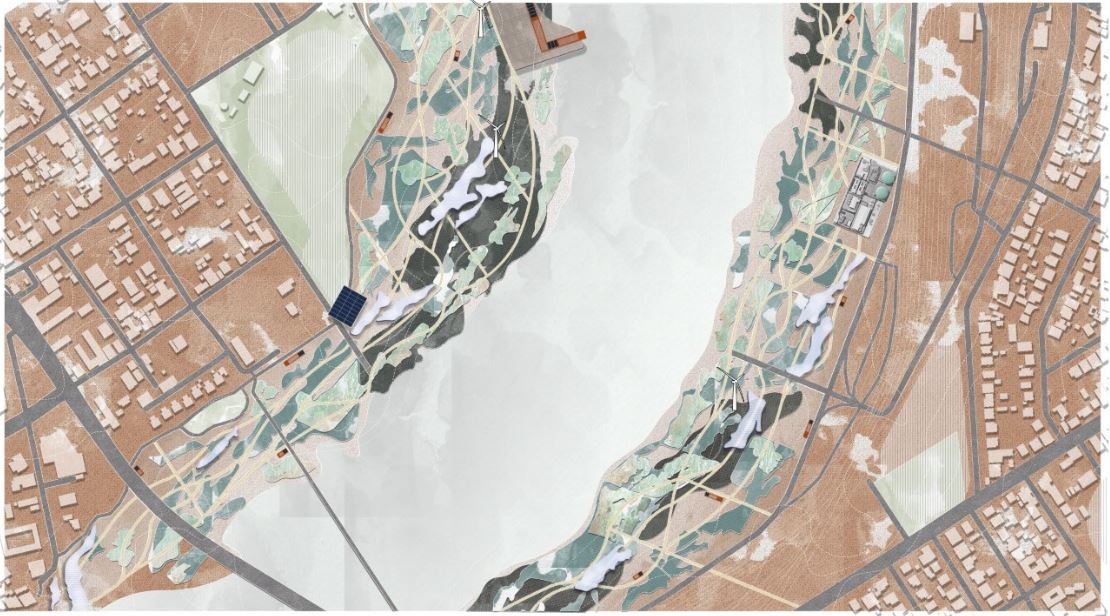13 December 2021
Congratulations to Ziyan Qi for receiving the 2021 Rodney Beames Award for her project Port Augusta - Ophelia Edible Park!
The Rodney Beames Award was established in 2000 as an annual award to recognise South Australian Landscape Architect Rodney Owen Beames.
The prestigious Rodney Beames Award is an initiative of the Australian Institute of Landscape Architects - South Australia (AILA SA) and HASSELL focused on the promotion and development of the excellence of art in landscape architecture, recognising the commitment and interests of Rodney Beames.

Ziyan Qi is finishing her Master Degree of Landscape Architecture at the University of Adelaide. In recent two years, her research focuses on arid landscapes, native vegetable and fauna species in SA, and also, the impacts of landscape design on people's mental states, as most of us have been spending 2 years under mental instability. Ziyan Qi believes the aesthetic level of landscape projects is just a foundation, while the design approaches have the potential to relieve social conflicts such as poverty, food insecurity, discrimination, and ecological crisis, so that make landscape design a remedial tool.

Ziyan Qi’s project 'Ophelia Coastal Park' is a signal and stimulation of the rebirth of Port Augusta’s ecology and economics upon the ruins of the fossil fuel industry. The park’s name is taken from Shakespeare’s Ophelia to capture the complexity of Port Augusta’s renewal. There have been many interpretations of Shakespeare’s Ophelia; most imposed upon her by others. In this instance, the tragic figure of Ophelia is used as a metaphor for self-determination as Port Augusta breaks with tradition and searches for a new identity. Once the location for major fossil fuel energy production, Port Augusta is currently transitioning to a cleaner future based on renewable energy projects. Investment in massive solar and wind renewable energy projects around Port Augusta will help South Australia achieve 100% net renewable energy by 2030. However, this investment has not generally been inclusive, and the town and its vulnerable communities may miss out on the benefits of this new economy unless a more community-focused approach is taken. This project addresses the challenge of a community-based sustainable transition and attempts to balance industrial development with ecological and social initiatives.
The Ophelia Edible Park project is located on the coastal areas of Port Augusta City and Port Augusta West to develop a botanical and agricultural attraction that is productive in various ways. The initiative involves developing linkages with peri-urban energy parks and the utilisations of vacant lands inside and on the fringes of the urban landscapes. It aims to form a sustainable and accessible food-producing landscape. Adopting a hybrid, multi-functional approach, the park is a recreational and productive economic landscape. Ecological habitat, community food production, urban-suburban energy production, and community sociability are the four landscape programs that are developed and interwoven within the park. However, the principal program that defines the park is urban agriculture. The crops selected celebrate Australia’s unique cultural biodiversity which offers a sustainable basis for diversification in agriculture based on the oldest continuous living culture in the world. Plants such as samphire, sea celery, wild parsnip, warrigal greens, and bush tomato are grown either in the tough exposed coastal environment or sheltered within large community-based greenhouses of various sizes. The design of the park is inspired and generated using the geometries of the local botanical species such as samphire and also the inspiring profile of the Flinders Ranges which frame Port Augusta as a majestic blue landmark in the distance.

View more project details here.
CITATION
Qi Ziyan – Port Augusta Ophelia Edible Park
With a strong acknowledgement of Port Augusta’s landscape, Ziyan’s thought-provoking project shows a clear understanding of natural systems, demonstrating her developing skills to use design to address climate change. This was evident in her approach to the planting design along the foreshores of Port Augusta.
Referencing the principles of biophilic design informed the design and use of structures and artful built form throughout the project.
Ziyan raises current topical themes of Australia’s sustainable food supply and power generation, demonstrating the scales involved and the positive social benefits.
The Jury commends Ziyan on a model project, showcasing how these objectives can be addressed and meaningfully integrated within other large scale projects of the future
Daniel Bennett
AILA SA President and 2021 Rodney Beames Jury Chair